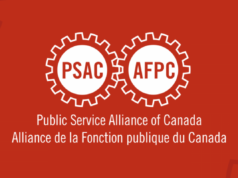June is National Indigenous History Month, an opportunity to honour and celebrate the unique achievements, history and culture of First Nations, Inuit, and Métis communities. It’s also a time to listen, learn, and amplify Indigenous voices.
As part of this month’s celebrations, the Public Service Alliance of Canada (PSAC) joins Indigenous organizations across Canada in calling for Prime Minister Justin Trudeau to declare June 21, National Indigenous Peoples Day, a national statutory holiday. Indigenous peoples and their heritage deserve to be fully recognized and celebrated at the forefront of Canadian culture.
A national statutory holiday would provide an opportunity for everyone in Canada to engage in activities that foster understanding, appreciation, and dialogue between Indigenous and non-Indigenous communities. It would also encourage people to participate in educational exercises, cultural events, and meaningful commemorations that deepen our knowledge and appreciation of the diverse histories, cultures and accomplishments of First Nations, Inuit and Métis peoples.
It is time Indigenous peoples get the recognition they so rightly deserve in our communities and society.
Together, we have the power to make a difference and create a society where Indigenous heritage is celebrated and respected and make meaningful progress towards reconciliation and decolonization.
Learn more about Canada’s rich Indigenous heritage
PSAC is committed to ongoing education that fosters respect and support for Indigenous members and communites, and we’ve compiled resources to help you learn more.
What to watch
- Thunder Bay – A four-part documentary series about the recent deaths of multiple Indigenous people that sheds light on the history of racism in Thunder Bay and examines the failings and the injustices of its social systems and institutions.
- Little Bird – A drama series about a young woman in search of her family history who discovers that she was one of the generation of children forcibly apprehended by the Canadian government through a policy, later coined the 60s Scoop.
- Mary Two-Axe Earley: I Am Indian Again – A documentary about the woman who fought for more than two decades to challenge sex discrimination against First Nations women embedded in Canada’s Indian Act and became a key figure in Canada’s women’s rights movement.
What to read
- True Reconciliation: How to Be a Force for Change by Jody Wilson-Raybould – an accessible roadmap to advancing reconciliation across Canada with three core practices—Learn, Understand, and Act—that can be applied by individuals, communities, organizations, and governments.
- Truth Telling: Seven Conversations About Indigenous Life in Canada – A collection of essays about the contemporary Indigenous experience in Canada — from resistance and reconciliation to the resurgence and reclamation of Indigenous power.
- Otter’s Journey Through Indigenous Language and Law by Lindsay Keegitah Borrows – This book uses the Anishinaabe tradition of storytelling to explore how Indigenous language revitalization can inform the emerging field of Indigenous legal revitalization.
- A Grandmother Begins the Story by Michelle Porter – Five generations of Métis women argue, dance, struggle, laugh, love, and tell the stories that will sing their family, and perhaps the land itself, into healing in this debut novel.
- Daughters of the Deer by Danielle Daniel – A historical novel that imagines the lives of women in the Algonquin territories of the 1600s, inspired by the author’s family’s ancestral link to a young girl who was murdered by French settlers.
- The Peacekeeper by B.L. Blanchard – Against the backdrop of a never-colonized North America, a broken Ojibwe detective embarks on an emotional and twisting journey toward solving two murders, rediscovering family, and finding himself.
This article was first posted on the PSAC website.





